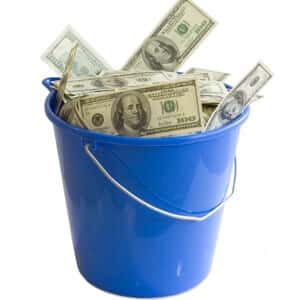
The pharmaceutical industry has historically been highly profitable. But in recent years there have been relatively few blockbusters like Prozac, Lipitor or Nexium. Such medications used to bring in tens of billions to the companies and their shareholders.
Now these drugs are available generically and the brand name versions are no longer making money as they once did. Firms have cut back on sales representatives and research teams.
The flow of exciting new drugs for common problems like infections, high blood pressure or pain has slowed to a trickle. Instead, the industry has focused on high-ticket niches such as lung cancer, resistant prostate cancer or hepatitis C.
Update 10/7/2014: Two weeks after we wrote this column, 60 Minutes aired a segment confirming that drug companies are in fact bankrupting America.
The price for many of these drugs is so astronomical they are out of reach for most patients. Insurance companies, Medicare and Medicaid are resisting reimbursement.
The most recent example is a breakthrough treatment for deadly skin cancer. Until recently, the most sophisticated treatment for advanced melanoma was Yervoy (ipilimumab). A course of treatment cost nearly $120,000.
The FDA just approved another important advance for treating recurrent melanoma. Keytruda (pembrolizumab) is the first of a new class of medicines called PD-1 (programmed death receptor 1) inhibitors.
Cancer researchers are very excited about these immune system boosters for a variety of cancers, but the price tag is staggering. It is predicted that Keytruda will cost $12,500 a month or about $150,000 a year. A new lung cancer medication called Zykadia (ceritinib) could cost even more, about $13,200 a month.
It’s not just cancer medicine. An important advance in treating hepatitis C was approved by the FDA last year. Sovaldi (sofosbuvir) is better tolerated and more effective at clearing this virus from the body than previous antiviral medications. At $1,000 per pill, a course of treatment will run about $84,000. With as many as three million people infected with this virus, the manufacturer stands to make billions.
Who is paying for these pricey new prescriptions? Insurance companies are balking. In some cases they are denying coverage for the latest breakthroughs, whether they be for cancer or a hard-to-treat infection like hepatitis C. They are also raising their premiums so they won’t be left holding the bag.
Insurance companies are not the only ones who have to foot high bills. The public pays for Medicare that insures older people and Medicaid which covers poor people. The U.S. Department of Veterans Affairs also covers current and former service people. Our tax dollars pay for their medicines too.
The American public has seemingly tolerated the extraordinary prices drug companies are charging for new cancer drugs because cancer is such an emotional topic. But patients are experiencing huge copayments. When a medication costs over $100,000 a year, the patient’s out-of-pocket costs could exceed $10,000.
When there are future drug breakthroughs for Alzheimer’s disease, ALS or Parkinson’s disease, the price of the medications might well break the bank. If the pharmaceutical industry continues to price its products out of reach, it runs the risk of becoming unsustainable.
We would love to see your thoughts below. Is $1,000 per pill a fair return on investment or price gouging?
During hurricanes or other natural disasters we do not allow businesses to take advantage of peoples’ misery by charging outrageous prices for water, gas or food. It is unlawful to sell essential commodities at high prices during a state of emergency. Should we allow drug companies to charge “what the market will bear” during a health care emergency like cancer? What do you think?
Read our follow-up post on skyrocketing drug costs here.

